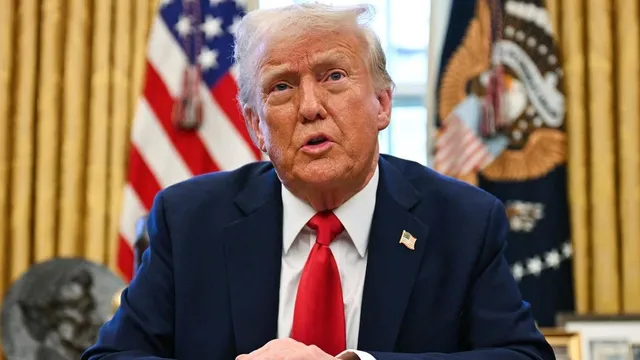
Trump's executive orders eliminate DEI initiatives in the federal government
2025-02-14 12:18- In January 2025, the U.S. State Department issued a directive against acknowledging Black History Month.
- Google removed references to significant cultural months from its calendar amid the political climate.
- The lack of support for DEI initiatives raises concerns about the State Department's ability to effectively lead on the global stage.
Express your sentiment!
Insights
In January 2025, the U.S. State Department faced significant cultural shifts after a directive was issued to employees discouraging the acknowledgment of Black History Month, breaking from longstanding traditions. This directive aligned with former President Donald Trump's broader agenda against diversity, equity, and inclusion (DEI) efforts, which he began promoting during his administration. Trump's administration had previously sought to dismantle various DEI programs aimed at supporting underrepresented groups, including Black employees in federal agencies. The memo's implications raised concerns regarding the effectiveness and legitimacy of U.S. foreign policy as it increasingly struggled with diversity within its ranks. Furthermore, the tech giant Google removed significant cultural observances from its calendar, including the beginnings of Black History Month, Pride Month, and Women's History Month. This decision was presented as a response to feedback about managing global cultural moments, following a period during which Google emphasized DEI initiatives. As part of a political climate influenced by Trump's actions and perspectives, the decision to omit these months reflected a broader backlash against the celebration and recognition of historically marginalized groups, echoing sentiments seen in governmental entities. The lack of acknowledgment for Black History Month at the State Department illustrates a continued struggle for Black employees seeking inclusion, retention, and upward mobility. House Foreign Affairs Committee Democrats urged Secretary of State Marco Rubio to maintain diversity initiatives, emphasizing their critical role in achieving the United States' global objectives. The sentiment expressed within organizations that focus on increasing African American participation in foreign policy underscored the relentless pursuit of engaging leadership regarding recruitment and advancement efforts for Black employees. Their commitment served as a reminder of the significant hurdles faced in fostering a more inclusive environment. The ramifications of these changes are profound, as the United States shifts away from validating diversity as a core value of its foreign policy. Allegations of racism and marginalization have surfaced among workers within the State Department, leading to an erosion of trust and morale among employees. As the country grapples with these internal conflicts and the implications for global leadership, the absence of diversity may jeopardize not only the effectiveness of American diplomacy but also its standing on the world stage.
Contexts
The impact of Donald Trump's policies on Diversity, Equity, and Inclusion (DEI) initiatives within the federal government has been significant and multifaceted. During his administration, a series of executive orders and policy shifts were implemented that not only reshaped the landscape of DEI efforts but also ignited widespread debates regarding the role of these initiatives in government and society at large. The focus on deregulation and reducing the size of government led to the dismantling of several programs that had aimed to promote diversity and inclusion among federal employees, thus creating an environment where DEI strategies were de-emphasized or considered incompatible with the administration's overall goals. As a result, the federal workforce experienced challenges in advancing equitable policies that addressed systemic inequalities, which had been gradually building up in past administrations. Another critical aspect of Trump's approach to DEI was manifested in his public rhetoric and messaging. The administration prioritized merit-based policies over identity-based initiatives, often disparaging the concept of affirmative action and labeling DEI programs as divisive. This rhetoric contributed to a cultural shift that influenced not only federal agencies but also private sector organizations and educational institutions, as it fostered an environment of skepticism towards initiatives designed to promote racial and gender equity. Many employees and advocates for DEI found themselves navigating a landscape where support for such initiatives waned, thereby affecting recruitment, retention, and promotion practices in the federal government and beyond. Furthermore, the rollback of federal guidance documents that had previously supported DEI initiatives posed challenges for agencies striving to create inclusive workplaces. The removal of frameworks that guided hiring practices and professional development opportunities for underrepresented groups created barriers to progress. Agencies were left to navigate these complexities without the support of federal standards that had previously encouraged diversity and fostered an atmosphere of inclusion across various levels of government. Consequently, this regulatory uncertainty stifled innovative practices aimed at creating a workforce reflective of the nation’s diverse population and undermined long-term commitments to fostering inclusive environments. In contrast, the end of Trump's presidency saw a renewed interest in restoring and advancing DEI initiatives within the federal government, as the incoming administration signaled a commitment to rebuilding those frameworks. There has been a push to reinstate policies that emphasize diversity, equity, and inclusion as critical priorities for the federal workforce. However, the legacy of Trump's policies continues to shape discussions about DEI, as stakeholders grapple with the effects of the prior administration's shifts and seek pathways to implement effective strategies that encourage participation and representation of historically marginalized groups in federal employment.